Certificate in Psychedelic-Assisted Therapies
The Certificate in Psychedelic-Assisted Therapies is dedicated to justice, equity, diversity and inclusion across the program and curriculum. This commitment is demonstrated through the cultivation of meaningful relationships with Indigenous lineage carriers, through inviting authentic conversations with educators and participants from diverse communities, and through collaborating with partners who share our values and commitment to equity in the field of psychedelic care.
Program Overview
The 2024 Naropa University Certificate in Psychedelic-Assisted Therapies is an 8-month, 150-hour, non-degree certificate program that provides postgraduate level training for advanced professionals working in relevant therapeutic areas, including mental health counseling and psychology, medicine, chaplaincy, and social work. Guided by distinguished Naropa faculty and leading experts in the field, participants receive an in-depth education in essential aspects of Psychedelic-Assisted Therapy, trauma-informed care, and spiritual integration. Program participants gain foundational clinical competencies in the practice of psychedelic-assisted therapy with ketamine and psilocybin, as well as an understanding of ceremonial plant medicine. Naropa’s dynamic contemplative-based training uniquely offers skill development in mindfulness practices essential for facilitators of psychedelic therapy. The program features a hybrid delivery of online and intensive retreat-based learning that is deeply rooted in ethics, psychedelic justice, and respect for the Indigenous roots of entheogenic medicine.
In collaboration with Lykos Therapeutics (formerly MAPS PBC), Naropa optionally offers additional education intended to raise awareness about the therapeutic approach and treatment modality delivered in the Lykos Therapeutics-sponsored clinical trials, which are investigating MDMA-assisted therapy for PTSD. Beginning in 2024, this portion of the certificate is optional and available only to those who meet the Lykos Therapeutics MDMA-Assisted Therapy Education Program eligibility criteria. The MDMA-assisted therapy curriculum incorporated into Naropa’s certificate includes online asynchronous coursework and a live educational event delivered by MDMA-assisted therapy educators.
What Makes Us Unique?
As North America’s leading institution of contemplative education, Naropa University is uniquely positioned to offer an innovative, experiential learning approach that is community-based, mindfulness-infused, and socially engaged. Like all education at Naropa, our psychedelic studies programs are grounded in integrated mindfulness and compassion practices—a training approach we believe to be essential for ethical and engaged psychedelic practitioners. Program participants will receive a deep grounding in principles of social justice, the Indigenous roots of natural medicine practices, and the powerful relationship between healing and spirituality. Naropa is proud to be one of the first fully-accredited universities to train the new vanguard of psychedelic therapists and facilitators.
Read the Tricycle Magazine feature on our program’s inaugural year.
Live Info Sessions
Join us live online to ask questions and learn more about our 2024 Certificate program! You are welcome to attend the session that best fits your schedule. Simple advance registration is required. Click the links below to register.
Certificate
Info Sessions
Thurs, January 18th, 2024,
Recording Now Available
With Sara Lewis, Ph.D, LCSW & Audra Barber, MA
Justice, Equity, Diversity, and Inclusion
Info Sessions
Weds, January 31st, 2024,
5:00 – 6:00 pm MT
With Victor Cabral, LSW & Syre Saniyah, Ph.D
Key Program Dates
Applications Open: Jan. 3, 2024
Applications Priority Deadline: Jan. 31, 2024
Current Admissions Status: Closed
Program Start: May 2024
Opening Retreat: May 15-19, 2024, Naropa University, Boulder, CO
MDMA-Assisted Therapy Education Event (Optional Add-on): July 18–23, 2024, 1440 Multiversity, Scotts Valley, CA
Apprenticeship Training Retreat: Nov. 20-24, 2024, 1440 Multiversity, Scotts Valley, CA
Program Ends: December 2024
Live Info Sessions
Join us live online to ask questions and learn more about our 2024 Certificate program! Click the links below to register.
Thurs 1/18 — 12:00 – 1:00 pm MT
Recording Now Available
With Sara Lewis, Ph.D, LCSW & Audra Barber, MA
Thurs 1/31 — 5:00 – 6:00 pm MT
JEDI Info Session with Victor Cabral, LSW & Syre Saniyah, Ph.D
Key Program Dates
Applications Open: Jan. 3, 2024
Applications Priority Deadline: Jan. 31, 2024
Current Admissions Status: Closed
Program Start: May 2024
Opening Retreat: May 15-19, 2024, Naropa University, Boulder, CO
MDMA-Assisted Therapy Education Event (Optional Add-on):
July 18–23, 2024, 1440 Multiversity, Scotts Valley, CA
Apprenticeship Training Retreat:
Nov. 20-24, 2024, 1440 Multiversity, Scotts Valley, CA
Program Ends: December 2024
Live Info Sessions
Join us live online to ask questions and learn more about our 2024 Certificate program! Click the links below to register.
Thurs 1/4 — 3:00 – 4:00 pm MT
With Sara Lewis, Ph.D, LCSW & Audra Barber, MA
Thurs 1/18 — 12:00 – 1:00 pm MT
With Sara Lewis, Ph.D, LCSW & Audra Barber, MA
Thurs 1/4 — 5:00 – 6:00 pm MT
JEDI Info Session with Diana Quinn, ND
& Victor Cabral, LSW
Thurs 1/31 — 5:00 – 6:00 pm MT
JEDI Info Session with Victor Cabral, LSW
& Syre Saniyah, Ph.D
Program Philosophy & Competencies
The Naropa Center for Psychedelic Studies (NCPS) approaches education from an intersectional, anti-oppression, and social justice lens, which we believe is essential for the ethical delivery of psychedelic medicine. The certificate program incorporates Justice, Equity, Diversity and Inclusivity (JEDI) training throughout the program. We aspire to create a brave space learning environment that centers the experience of historically-excluded and marginalized participants, encouraging all trainees to practice anti-oppressive skills at the interpersonal and collective level. We invite applications from participants who are ready to thoroughly investigate their own social location, power, privilege, and oppression as a foundational part of ongoing work for the ethical and safe delivery of psychedelic-assisted therapies.
Please see the Center’s Integrity Commitments for more details and resources.
The Naropa Certificate in Psychedelic-Assisted Therapies has Three Core Philosophies:

Contemplative Pedagogy
Naropa University is the world’s leading contemplative university, and a pioneer in the modern mindfulness meditation movement.
As a fully-accredited university, Naropa University maintains its visionary Buddhist-inspired contemplative pedagogy across diverse degree and non-degree programs.
Teaching mindfulness within the context of our intercultural campus and world, Naropa honors the cultural and historical roots of these practices while also acknowledging the gift inherent in stillness and silence.
All meetings, courses, retreats and other offerings are infused with contemplative practices and perspectives, ranging from mindfulness and compassion meditation practice to interculturally diverse contemplative community and nature-based spaces.
Naropa is the only training program working with Lykos Therapeutics to offer a contemplative-focused retreat-based educational experience.
Commitment to Anti-Oppression
- Curriculum begins with intensive Justice, Equity, Diversity and Inclusivity (JEDI) training where trainees learn the ways that power–personal power, role power, status power, and structural power–are inherently at play in therapeutic relationships.
- Trainees are introduced to several Indigenous sacred plant medicine traditions, understand the harms of colonial extraction cultural appropriation, explore what it means to be in right relationship to Native American and Indigenous stewards of sacred plant medicine traditions.
- Curriculum critiques ways that psychedelic medicine, psychiatry, and clinical research have been and continue to be a site of oppression of marginalized communities.
- The program provides JEDI Scholarships, the purpose of which is to provide financial support to assist those participants who further the University’s diversity mission with particular attention to, but not limited to, underrepresented populations, including people of color and other minority populations.
- Curriculum aims to take an explicitly intersectional, anti-racist, and anti-oppression lens.
- Participants are encouraged to explore the roots of entheogenic and traditional healing practices in their own cultural lineages and the ways in which such practices were interrupted by colonization.
Commitment to Excellence
- Program curriculum is presented under professional supervision with the support of small Practice Groups.
- Trainees will practice clinical skills in an intensive apprenticeship training retreat environment that includes supervisory evaluation and feedback.
- Curriculum provides up-to-date education in legal psychedelic therapies as well as the use of medicines at various stages of regulatory approval for therapeutic and adult use, including clinical trials investigating psychedelic-assisted therapies.
- Trainees are given a comprehensive, in-depth foundation with the understanding that, as with any specialty, many thousands of clinical hours are needed to become fully competent.
- Naropa carefully considers institutional partners and faculty to deliver the highest quality educational experience.
- Naropa faculty guide curriculum development and bring unique expertise in areas such as somatic psychology, eco-psychology, chaplaincy, professional ethics and transpersonal/contemplative psychology.
Program Format
The curriculum consists of 150 total hours of instruction, and utilizes a combination of online and residential retreat delivery. Both formats include a combination of lecture and discussion, small group integration, and experiential learning. As part of Naropa’s contemplative education pedagogy, interpersonal engagement, contemplative practice and personal reflection are emphasized toward nurturing the collective wisdom of the entire cohort.
Intensive Residential Retreats
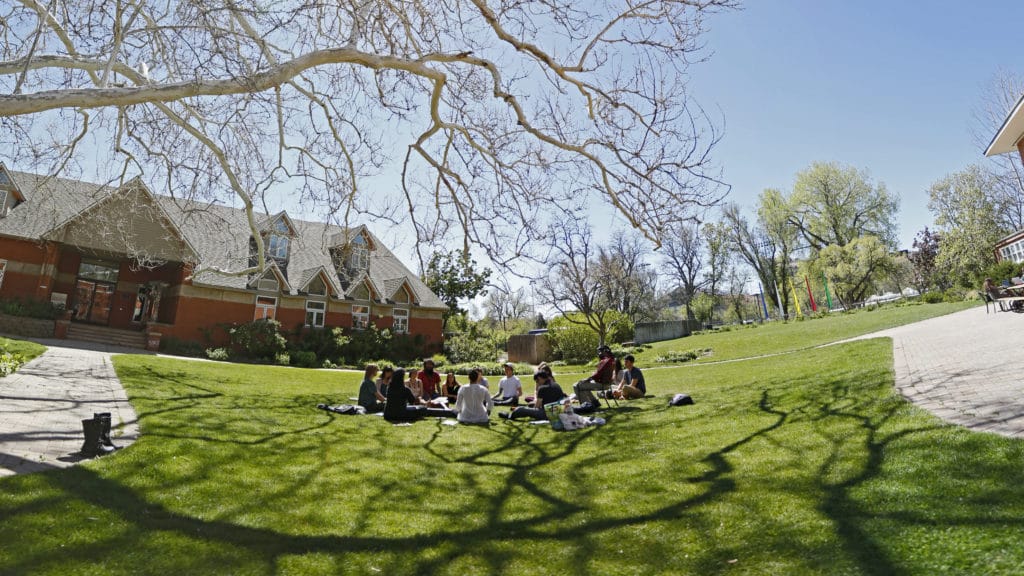
Opening Retreat
The certificate program begins with a five-day opening retreat at Naropa University in Boulder, CO, May 15-19, 2024. This retreat focuses on community building and contemplative practice training in mindfulness and compassion, which we believe is essential for educating ethical psychedelic-assisted practitioners. The Opening Retreat also includes lectures from contemplative leaders and experts in the field, and the opportunity to engage with Clinical Skills Practice Groups, which will continue for the duration of the program.
Additional Details: Opening Retreat
Building on the prerequisite course in Justice, Equity, Diversity and Inclusivity (JEDI), the opening retreat goes further in helping participants connect with Naropa University’s vision to realize and build an interconnected global community that embodies an enduring commitment to personal actions, interpersonal relations, and vocations that promote individual, collective and ecological liberation and wellbeing. Small group work initiated at the Opening Retreat engaging social location, interrogation of power, and working across differences will continue throughout the course of the program.
This retreat begins in the evening of May 15, and concludes at noon on May 19. Travel and lodging costs for this retreat are not included in the certificate program tuition. Participants are responsible for arranging their own travel and lodging in the Boulder area. Naropa provides on-site breakfast, catered lunch and refreshments.
All 2024 retreats and education intensives will be held in person. In order to mitigate the risk of COVID-19, Naropa University strongly encourages all participants to be vaccinated against COVID-19. Please see “Considerations Regarding COVID-19” on the Certificate Policies Page for more information. Please note that Naropa does not allow the use of unauthorized substances, including psychedelic compounds, during any retreat event.
Apprenticeship Training Retreat
The program continues with a required apprenticeship training retreat where trainees will participate in group sessions involving non-ordinary states under supervision and mentorship. This retreat will be held at 1440 Multiversity, a unique non-profit located in the redwood forest near Scotts Valley, California, which is dedicated to creating hope for living well, and has established itself as a premier learning destination. The 2024 apprenticeship options include Holotropic Breathwork or Ketamine-Assisted Therapy.
Additional Details: Apprenticeship Training Retreat
Experience with non-ordinary states of consciousness is central to Naropa’s Certificate in Psychedelic-Assisted Therapies. Naropa recognizes that trainees may have prior experience with psychedelic substances and/or non-ordinary states and associated modalities. However, trainees are required to fulfill this requirement while enrolled in the certificate program so as to experience facilitating a psychedelic therapy session under guided supervision, receiving instruction and feedback.
This retreat begins with a group dinner on November 20 followed by three full days of experiential training. Trainees depart on November 24 after breakfast. The 2024 apprenticeship options include Holotropic Breathwork or Ketamine-Assisted Therapy. Affinity group apprenticeship options will be offered for BIPOC and LGBTQIA+ trainees who choose to do this portion of their training within affinity space.
Trainees will not be required to consume substances in order to participate, and Breathwork practice is offered as a powerful non-pharmacological modality. However, if appropriate, trainees will benefit not only from deepening their clinical skills, but from experiencing psychedelic medicines in a safe container. The Apprenticeship Training Retreats will utilize a peer consultation model, where trainees receive structured feedback from peers along with written evaluation from faculty.
Dynamic, Cohort-Based Online Learning

Asynchronous Learning Modules
Participants accomplish 40 hours of online learning across eight different modules. Incorporating topical case studies, theoretical readings, knowledge checks, videos, and more. Asynchronous modules are completed at participants' convenience, within a monthly time frame.
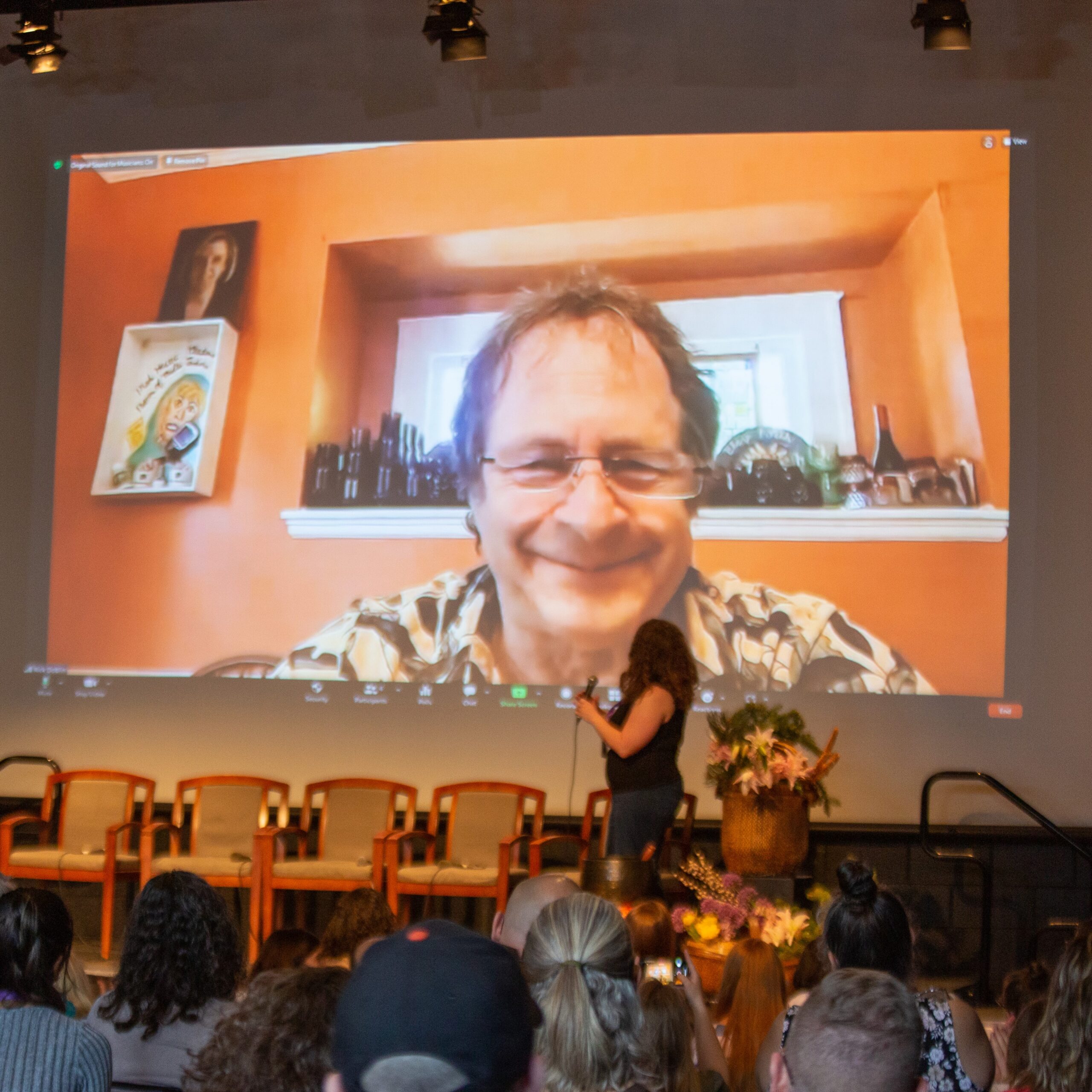
Live Online Class Sessions
Led by distinguished Naropa faculty and guest lecturers, live-online sessions allow participants to dive into the nuance of each course module and benefit from diverse perspectives. Live-online lectures are held on the second Saturday per month for five hours from June-December.
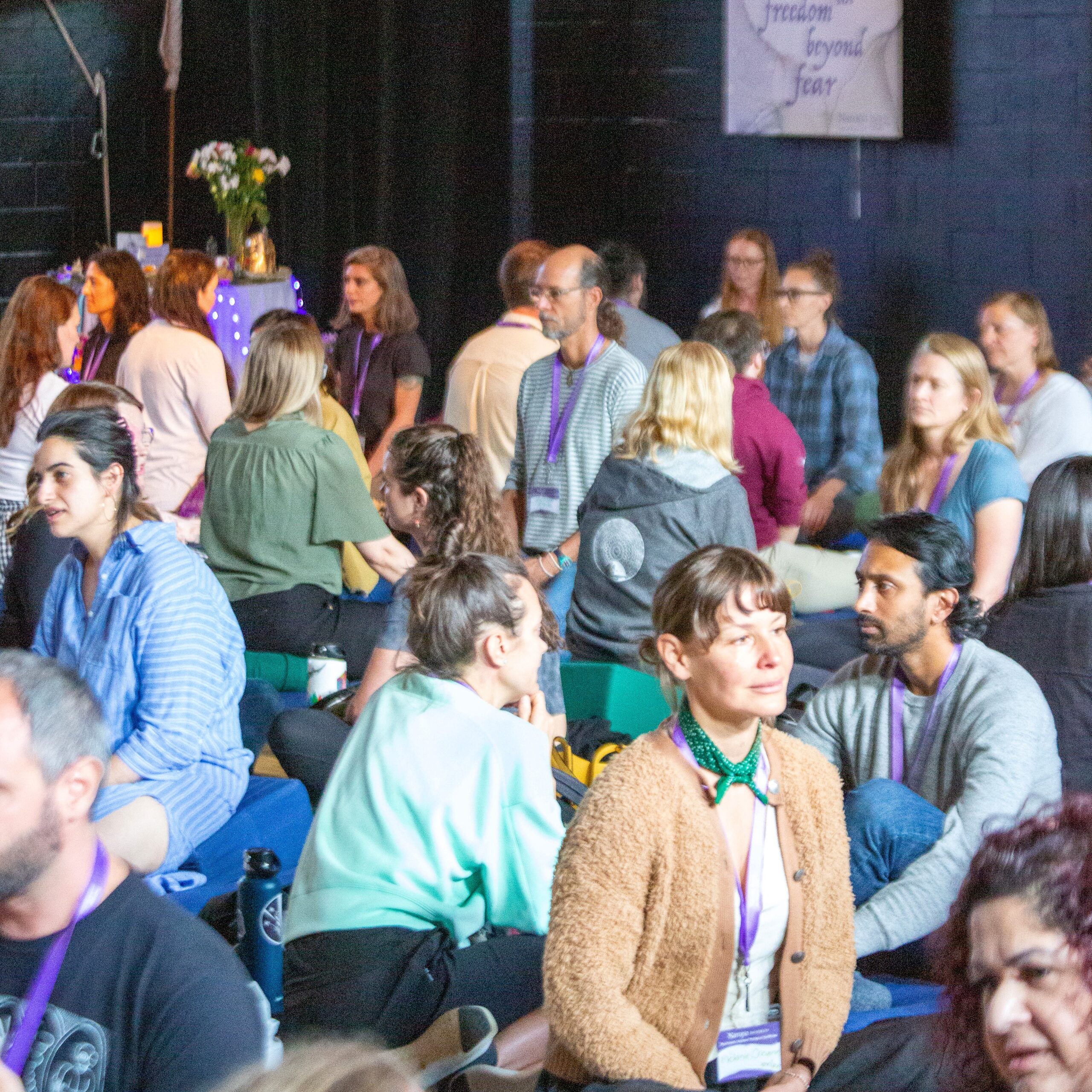
Clinical Skill Practice Group
Guided by a skilled cohort leader with a background in psychedelic-assisted therapy, participants apply core competencies and engage community learning principles in small practice groups. Groups meet online twice per month, and consist of 8-12 participants.
Affinity Opportunities
Affinity spaces serve as essential environments where People of the Global Majority—specifically BIPOC and LGBTQIA+ groups—can engage in experiences that center their unique cultural and identity-related needs. Integral to NCPS’s commitment to anti-oppressive and decolonized learning, these spaces provide safety and support, empowering and validating PGM experiences. Culturally aware by design, they foster a supportive atmosphere conducive to personal and collective growth, community building, and healing. Moreover, these environments challenge and move beyond the Eurocentric and heteronormative norms prevalent in education, mental health, and healing practices, contributing to a decolonization process that honors and integrates a multitude of perspectives and histories. Affinity spaces strengthen solidarity within and among communities, creating a more inclusive and competent framework for participants.
Over an 8-month period, participants will be guided through 8 distinct modules.
Topics include psilocybin, and ketamine therapies, as well as mindfulness-compassion training, psychedelic justice, and optional investigational MDMA-assisted therapy education. For a full list of module topics and schedule, expand below.
Program Modules & Schedule Overview
Synchronous Online Content Delivery Dates & Times Live Classes: Second or third Saturday of each month on Zoom, 10am-3pm U.S. Mountain Time (with a 1-hour lunch break): June 8, July 13, August 10, September 14, October 19, November 9 and December 14. Clinical Skills Practice Groups: Clinical Skills Practice Groups: Second and fourth Wednesday evening of each month (either 4:00-5:30pm MT, 6:00-7:30pm MT or 12:00-1:30pm MT depending on group time zone). Small group formation will include consideration of time zone. | |
| May 2024 | Asynchronous JEDI Prerequisite Course |
| May 15-19, 2024 | Opening Retreat, Naropa University Arrival and Registration: May 15, 3-5pm Departure: May 19, noon
|
| June 2024 | Module 1: Preparation
|
| June 29-30, 2024 | Online Weekend (Optional Add-on): Education Event
|
| July 2024 | Module 2: Ethics
|
| July 18-23, 2024 | Education Event (Optional Add-on): 1440 Multiversity, Scotts Valley, CA
|
| August 2024 | Module 3: Therapeutic Foundations
|
| September 2024 | Module 4: Therapeutic Skills
|
| October 2024 | Module 5: Integration
|
| November 2024 | Module 6: Group Facilitation
|
| November 20-24, 2024 | Apprenticeship Training Retreat: 1440 Multiversity, Scotts Valley, CA
|
| December 2024 | Module 7: Credentialing and Advocacy
|
Program Modules & Schedule Overview
Participants will move through the 8-month program with a series of monthly modules, in addition to the in-person retreats. Attendance is required; please see the program’s Attendance Policy details.
Live Classes: Second or third Saturday of each month on Zoom, 10am-3pm U.S. Mountain Time (with a 1-hour lunch break): June 8, July 13, August 10, September 14, October 19, November 9 and December 14.
Clinical Skills Practice Groups: Second and fourth Wednesday evening of each month (either 4-6pm MT or 6-8pm MT depending on group time zone). Small group formation will include consideration of time zone.
May 2024
Asynchronous JEDI Prerequisite Course
May 15-19, 2024 // Opening Retreat, Naropa University
Arrival and Registration: May 15, 3-5pm
Departure: May 19, noon
- Contemplative Practice Intensive
- History of Psychedelics
- Plant Medicines
- Justice, Equity, Diversity and Inclusivity (JEDI) Intensive
- Ecopsychedelics
- Introduction to Psychedelic-Assisted Therapies
June 2024 // Module 1: Preparation
- Screening
- Clinical Assessment
- Spiritual Assessment
June 29-30, 2024 // Online Weekend (Optional Add-on): Education Event
- MDMA-assisted Therapy Education Event begins online with Lykos Therapeutics
July 2024 // Module 2: Ethics
- Ethical Integrity
- Therapeutic Touch
- Trauma-Informed Approaches
- Investigational MDMA-assisted Therapy Education (Optional Add-on)
July 18-23, 2024 // Educational Event (Optional Add-on): 1440 Multiversity, Scotts Valley, CA
- Investigational MDMA-assisted Therapy Live Education Event with Lykos Therapeutics
August 2024 // Module 3: Therapeutic Foundations
- Non/Inner-Directed Approaches
- Deep Listening
- Inner Healing Intelligence
- Ketamine-assisted Therapy
September 2024 // Module 4: Therapeutic Skills
- Transference/Countertransference
- Enactments and parallel process
- Psilocybin-assisted Therapies
October 2024 // Module 5: Integration
- Principles of integration
- Expressive Arts
- Somatic Approaches
- Ayahuasca and Iboga therapies
November 2024 // Module 6: Group Facilitation
- Ketamine-assisted Therapy
- Group Facilitation Skills
- Community Healing: Integration Beyond the Individual
November 20-24, 2024 // Apprenticeship Training Retreat: 1440 Multiversity, Scotts Valley, CA
- Holotropic Breathwork and Ketamine options
- Affinity groups for BIPOC and LGBTQ+ trainees
December 2024 // Module 7: Credentialing and Advocacy
- PAT Credentialing
- Setting Up a Psychedelic Practice
- Creating Equitable Access
+ Optional Program Add-on
Lykos Therapeutics MDMA-Assisted Therapy Education
In collaboration with Lykos Therapeutics (Formerly MAPS PBC) Naropa offers education intended to raise awareness about the therapeutic approach and treatment modality delivered in Lykos Therapeutics -sponsored clinical trials investigating MDMA-assisted Therapy for PTSD. The MDMA-assisted therapy curriculum incorporated into the Naropa University Certificate in Psychedelic-Assisted Therapies includes online asynchronous coursework and a week-long live education event delivered by Lykos Therapeutics MDMA-assisted therapy educators. Beginning in 2024, participants may choose to include MDMA-assisted therapy education as part of the Naropa PAT Certificate. This optional add-on is only available to those who meet the eligibility criteria defined by Lykos Therapeutics.
The Lykos Therapeutics MDMA-assisted therapy education delivered within Naropa’s Certificate in Psychedelic-Assisted Therapies is intended to provide foundational information on the inner-directed therapeutic approach practiced in Lykos Therapeutics clinical trials. Participants will complete aspects of the curriculum throughout Naropa’s certificate program, and will also participate in an education event, led by MDMA-assisted therapy educators working with Naropa faculty.
The Lykos Therapeutics MDMA-Assisted Therapy Education Optional Add-on Includes:
- 10-15 hours of asynchronous learning (June)
- In-Person Education Event (July 18-23): 1440 Multiversity, Scotts Valley, CA
- Online Education Weekend (June 29-30): Live online
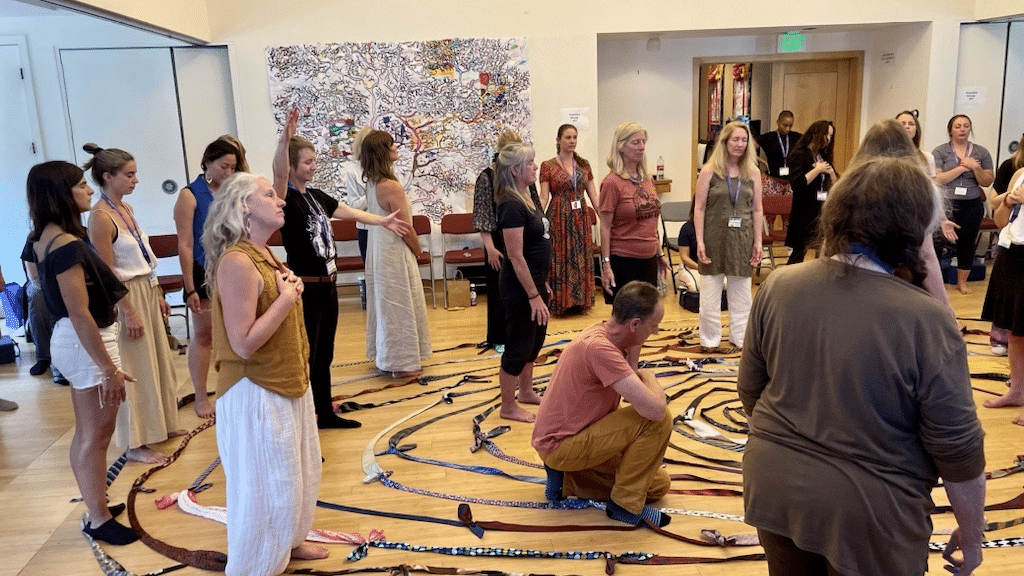
The Lykos Therapeutics Education Program
From Lykos Therapeutics: There are no guarantees about the approval of our New Drug Application (NDA) or what the specific requirements for clinicians interested in practicing MDMA-assisted therapy will entail in the event of approval. For these reasons, we currently only offer education, not training, on the fundamental processes and concepts underlying investigational MDMA-assisted therapy. We reserve training for clinical trial investigators in approved clinical settings. There are currently no certification standards for any psychedelic-assisted therapy given the investigational status of this modality, which has not been approved by the U.S. Food and Drug Administration (FDA) or any regulatory authority.
At Lykos Therapeutics, we have a long history of supporting the education of clinicians seeking to expand their conceptual understanding of investigational MDMA-assisted therapy and the therapeutic techniques that support its implementation. Please note this is not a certification course to deliver MDMA-assisted therapy. There are currently no certification standards for any psychedelic-assisted therapy given the investigational status of this modality.

MDMA-Assisted Therapy Education Event
The Lykos Therapeutics MDMA-Assisted Therapy Education Program includes a required four-day intensive in-person event led by MDMA-assisted therapy educators and Naropa faculty. Participants will deepen their understanding of the therapeutic approach through scenario based learning, didactic education, small and large group discussions, and video case presentations from MDMA-assisted therapy clinical trials. Attendees will complete 10-15 hours of asynchronous learning before attending the Lykos Therapeutics education event.
This retreat will be held at 1440 Multiversity, a unique non-profit located in the redwood forest near Scotts Valley, California, which is dedicated to creating hope for living well, and has established itself as a premier learning destination. Travel and lodging costs for this education event are not included in the certificate program tuition. Participants are responsible for booking their preferred room and board directly with 1440 Multiversity via a dedicated registration gateway, which will be provided after the start of the program. Pricing ranges from $165 – $385 per night depending on the lodging option, which is offered at cost and reflects Naropa’s special discounted rate for the program.
All 2024 retreats and education intensives will be held in person. In order to mitigate the risk of COVID-19, Naropa University strongly encourages all participants to be vaccinated against COVID-19. Please see “Considerations Regarding COVID-19” on the Certificate Policies Page for more information. Please note that Naropa does not encourage or allow the use of unauthorized substances, including psychedelic compounds, during any retreat event.
Ready To Apply?
Certificate trainees are empowered to embody the “transform yourself, transform the world” ethos of Naropa University within the dynamic and rapidly-expanding field of psychedelic-assisted therapy and advocacy.
How This Certificate Prepares Practitioners for Work in the Psychedelic-Assisted Therapies Field
Psychedelic-Assisted Therapy (PAT) is a rapidly evolving field. The future trajectory and guidelines for practicing Psychedelic-Assisted Therapies are yet to be determined by regulatory bodies, and will vary by region, regulatory agency, and protocol.
2024 marks an exciting time in the psychedelic landscape where states including Oregon and Colorado, along with other states with pending legislation, have implemented pathways to legal access to psilocybin facilitation. Naropa’s Certificate in Psychedelic-Assisted Therapies is an Approved Training Program for Oregon Psilocybin Services (OPS) facilitator training, as is Naropa’s new Psilocybin Facilitator Training certificate program. Oregon residents interested in becoming licensed facilitators will need to complete additional steps prior to applying with the state, including the Practicum and OPS Facilitator Exam requirements.
Psilocybin research demonstrates promising results for the treatment of depression, end-of-life anxiety, addiction, and other mental health conditions, but the future timeline and trajectory for legal and FDA-approved psilocybin-assisted therapy is yet to be determined. There is currently litigation in federal court seeking to make psilocybin available to patients with life threatening conditions under the federal Right to Try Act. Depending on the outcome, there may soon be a pathway to lawfully engage in psilocybin therapy with qualified clients.
In 2022 Colorado passed the historic Natural Medicine Health Act (NMHA), a measure that decriminalized psilocybin mushroom possession for adults, and will allow state-licensed treatment centers to administer psilocybin according to state regulations. Naropa’s PAT Certificate program has the intention to become a certified training program for prospective psilocybin providers in the state of Colorado. As guidelines for practitioners in Colorado become available, Naropa will aim to meet and fully comply with those training standards.
MDMA-assisted therapy is not approved by any regulatory agency. While Lykos Therapeutics is working on the New Drug Application to the FDA, there are no guarantees about the approval of MDMA-assisted therapy, or what the specific requirements will be for healthcare providers wishing to deliver this treatment in the future. There are currently no certification standards for any psychedelic-assisted therapy given the investigational status of this modality.
Ketamine-assisted therapy is currently approved for off-label use by qualified clinicians working with an authorized prescriber. All certificate enrollees will receive foundational training in Ketamine-assisted therapy. We provide introductory training in psychopharmacological mechanisms, clinical indications and contraindications, and understandings of assessment, treatment planning and coordinating care in treatment teams. Unlike with other psychedelic medicines, where there will be specific certifications and/or supervision needed, there is no nationally recognized certification required to provide Ketamine-assisted therapy.
Many Naropa certificate program alumnx are currently practicing in the field by offering psychedelic integration, participating in clinical trials research, and offering ketamine-assisted therapy.
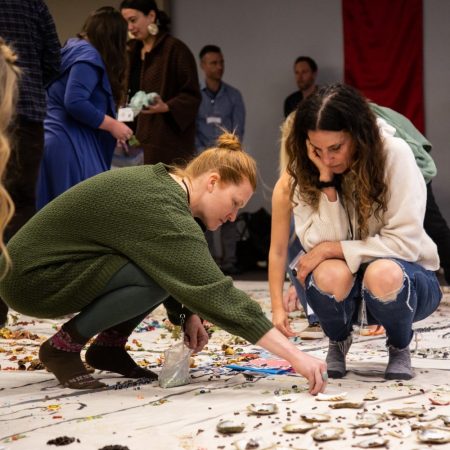


Program Faculty
Naropa Center for Psychedelic Studies Leadership Team

Sara Lewis, Ph.D, LCSW
Director of Training & Research, NCPS ⓘ
Dr. Sara Lewis is Associate Professor and Chair of Buddhism-Informed Contemplative Counseling at Naropa University. She earned her PhD from Columbia University and MA from the University of Chicago, specializing in psychological anthropology and clinical social work. She is author of Spacious Minds: Trauma and Resilience in Tibetan Buddhism, (Cornell University Press, 2019) and a former Fulbright fellow. Sara is a therapist with MAPS MDMA-assisted therapy study site in Boulder, CO and has conducted research on how psychedelics can be a catalyst for change in psychotherapy.

Joe Harrison, MS
Executive Director, NCPS ⓘ
Joe’s career has focused on studying organizational leadership and on medications development for the treatment of substance use disorders. Prior to joining Naropa, he worked at Johns Hopkins University’s Behavioral Pharmacology Research Unit managing a large research group, conducting clinical trials, creating experiential programs for students, and fostering collaborative private-sector relationships. While at JHU, he was an advisor to the Center for Psychedelic and Consciousness Research and held positions on boards and committees focused on business development, diversity and inclusion, community outreach, and research oversight. He is the co-founder of Peabody Pharmaceuticals, a company whose mission is to minimize the role that prescription pain medications play in the opioid epidemic. He holds a BS in Psychology from Towson University and a MS from Johns Hopkins in Regulatory Science. Joe lives in Baltimore, MD with his family, has a personally meaningful yoga practice, and fly fishes the Chesapeake Bay region during his free time.

Diana Quinn, ND
Director of Clinical Education, NCPS ⓘ
Dr. Diana Quinn (she/her) is a licensed naturopathic doctor, healing justice practitioner, and psychedelic educator. She identifies as a queer mestizo Chicana and has nearly 20 years of service to BIPOC, LGBTQIA+, and other marginalized communities. Dr. Quinn is the Director of Clinical Education at the Naropa Center for Psychedelic Studies, where she supports the Certificate in Psychedelic-Assisted Therapy program and directs the Psilocybin Facilitator Training certificate program. In the emerging field of psychedelic therapy, she works to build more just, ethical, and safe approaches to delivery of care. Her work in psychedelic education centers historically excluded communities, offering anti-oppressive curriculum and training for psychedelic facilitators in both the medical and adult-use models. She serves on numerous advisory boards where she brings a dedication to ethical integrity, equity, accessibility, and Indigenous reciprocity in the psychedelic field.

Victor Alfonso Cabral, LSW
Assistant Director of Community Care, NCPS ⓘ
Victor Alfonso Cabral, LSW, is an Afro-Latinx professional deeply dedicated to serving historically marginalized communities. Drawing from his personal and professional experiences, Victor approaches his work with empathy and strategic insight. His varied career includes contributions to policy development, community outreach, training and education, and community mental health services. He is a licensed social worker and therapist in the Commonwealth of Pennsylvania, with training in MDMA/Ketamine/Psilocybin-Assisted Psychotherapy and Internal Family Systems.
As the former Director of Policy and Regulatory Affairs at Fluence Training, Victor was instrumental in guiding policy initiatives, shaping inclusive training curricula, and fostering connections among key stakeholders in the field of psychedelic medicine.
Prior to joining Fluence, Victor served as Deputy Director for the Pennsylvania Governor’s Office of Advocacy and Reform where he helped shape regulations for youth detention centers and residential treatment facilities. He facilitated the establishment of the first Racial Day of Healing in Pennsylvania history and developed accessible trauma training for Pennsylvanians.
He is actively involved in a documentary film titled ‘We Are The Medicine’, which seeks to highlight the importance of BIPOC voices in the psychedelic community (www.PictureAColorfulWorld.com) He was recognized in the Students for Sensible Drug Policy’s “40 Under 40 Outstanding BIPOC Leaders in Drug Policy” and received the 2022 Emerging Social Work Leader Award from the National Association of Social Workers of Pennsylvania.

Belinda Eriacho
Program Advisor ⓘ
Belinda is of Dine’ (Navajo) and A:shiwi (Pueblo of Zuni) descent. Her maternal clan is One-Who-Walks-Around and she was born for the Zuni Pueblo people. Belinda was born and raised on the Navajo reservation, located in Arizona, United States of America.
She is the wisdom carrier, healer, and founder of Kaalogii LLC, focused on cultural and traditional teaching, inner healing, and an international speaker on various topics impacting Native American communities in the United States.
Belinda holds degrees in Health Sciences, Technology, and Public Health. In addition, Belinda has participated in the Multidisciplinary Association for Psychedelic Studies, MDMA People of Color, and Eye Desensitization and Reprocessing Therapy Training Programs.
Belinda is also a Founder and Board member of the Church of the Eagle and the Condor, a Program Advisor for Naropa University, and a Native American Traditional Advisor for SoundMind.
She is the author recent articles that are available on charuna.net: “Considerations for Psychedelic Therapist when working with Native American People and Communities”, “ Guidelines for Inclusion of Indigenous People into Psychedelic Science Conferences” and “This is not Native American History, this is US History with Belinda Eriacho”. In addition, a contributing author to the recently published Psychedelic Justice: Toward a Diverse and Equitable Psychedelic Culture.
Website: www.kaalogii.com
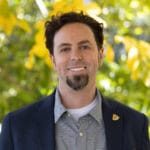
Austin R. Pick, MA
Executive Director, Extended Campus ⓘ
Austin R. Pick is Executive Director of Extended Campus. He holds an MA in Religious Studies from Naropa, where he has been on staff since 2014. Austin’s fiction and non-fiction writing has appeared in a variety of publications, including The Arrow, The Stockholm Review of Literature, and Epiphany. He served as contributing editor of Along the Path: The Meditator’s Companion to the Buddha’s Land, a dharma travel guide published by Pariyatti Press in 2009. Austin’s passion for contemplative practice and inventive language reflects his dedication to developing an ever more conscious engagement with our ongoing composition of the world—one that is expansive, inclusive and compassionate.

Audra Barber, MA
Education and Engagement Manager, Extended Campus ⓘ
Audra Barber is a Education and Engagement Manager for Naropa University’s Extended Campus. She holds a MA in Communication Studies from the University of Colorado Boulder. Audra repurposed her master’s thesis, An Eco-Spiritual Approach to Solving Climate Change, into a 2022 TEDxCU talk titled, Environmental Interdependence is our Climate Solution. Dedicated to creative and embodied problem-solving, Audra is thrilled to support the Psychedelic-Assisted Therapy Training Program and other Extended Campus programming.
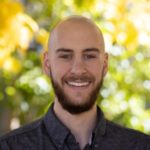
Jacob Goldberg
Lead Program & Comm. Manager, Extended Campus ⓘ
Jacob Goldberg is the Lead Program and Communications Manager for Naropa University’s Extended Campus. He holds a BA in Environmental Studies from Naropa University, where he has been on staff since 2020. Jacob believes that business, technology, and industry can be used as a force for social and environmental change, evident in his undergraduate thesis Examining the Triple Bottom Line: Patterns Within the Field of Sustainable Business. As a member of the Extended Campus team, Jacob is proud to develop and support public offerings that exemplify mindful leadership, diversity and inclusivity, and contemplative pedagogy.
Featured Faculty

German F. Ascani, MD, MS
PRATI & MAPS ⓘ

NiCole Buchanan, Ph.D
American Psychedelic Practitioners Association ⓘ
NiCole Buchanan, Ph.D., Professor, co-Chair of the APPA Board of Directors, member of the Board of Directors and the Racial Equity and Access Committee for the Chacruna Institute for Psychedelic Plant Medicine and has trained with MAPS, the CIIS Certificate for Psychedelic Research and Therapy, and the Polaris Insight Center.
Dr. Buchanan is a Fellow of the Association for Psychological Science, the American Psychological Association, and has received international awards for her contributions to the field. An accomplished consultant, writer, and scholar with over 120 publications and international speaker including TEDx and National Public Radio.

Carla Burns, MDiv
Naropa University ⓘ

Stacia Butterfield
Holotropic Breathwork® Facilitator ⓘ
Stacia Butterfield completed her Somatic Practitioner program in 1999, going on in 2000 to work at Healing Visions, an early Ibogaine clinic in St. Kitts, BVI, under the leadership of Dr. Deborah Mash. She then certified as a Holotropic Breathwork facilitator in 2005 and joined the Grof Transpersonal Training staff in 2006. She worked closely with Stanislav Grof for 13+ years, bringing Holotropic Breathwork to large public groups and a variety of academic and professional settings, including California Institute of Integral Studies, Tel Aviv University, MAPS Psychedelic Science 2013 & 2017 conferences, Sophia University, Kripalu and the Fetzer Institute. Stacia’s long interest in the wisdom of the body and deep trust in the intrinsic healing orientation of the psyche informs her work with others.

Christine Pateros, MA, RN
PRATI ⓘ
Chris Pateros, MA, RN was called to existential work with psychedelics in 2011 through her own death experience in psychedelic ceremony in the Amazon jungle.
Chris brings over three decades of experience in clinical health care, research, and teaching to her work and since training with Ketamine Training Center in 2019, she has been guiding clients both privately and in groups with ketamine-assisted treatment and integration honoring connection to the sacred and interconnection of self, nature, spirit, and the mystery that is beyond what our minds know. Chris earned her Transpersonal Ecopsychology M.A from Naropa University, is a graduate of the Light Body School of The Four Winds Society, and is an initiate of the Qero indigenous mystics of the Andes. She is a PRATI co-founding member, core lead faculty and course director of the End of Life/ Existential Distress KAP and PAT Training. Chris lives in Boulder and works with clients in Denver, Boulder and Chicago and distance globally.

Alessandra Santos-Pye, LPC
The Chrysalis Institute ⓘ
Alessandra Santos Pye is a psychedelic-assisted therapist, psychotherapist, facilitator and artist. Her clinical approach and facilitation offerings center relational dynamics rooted in ceremony, restorative justice, trauma informed care, and the expressive arts. Born in São Paulo, Brazil, original territory of the Tupi Guarani, her identity is multifaceted by Indigenous, West African, and European ancestry. Alessandra is the Founder and Creative Director of the Chrysalis Institute, whose mission is to expand the spectrum of opportunities available to emerging BI&POC artists by supporting self-exploration, self-care, and contemplative practices. She is at home in group retreat environments and values crafting experiences that are both engaging and restorative.
Alessandra has earned post-graduate certificates from the Center for Psychedelic Studies and Research at the California Institute of Integral Sciences and the Naropa Center for Psychedelic Studies. She currently serves Naropa University as core faculty, and cohort leader for the Psychedelic-Assisted Therapy certificate program. Alessandra also supports MAPS-PBC education offerings as a program assistant. She is a member of the American Psychedelic Practitioners Association and is deeply passionate about processes involving thoughtful preparation, delivery, and integration of psychedelic experiences.

Charlotte Z. Rotterdam
Naropa University ⓘ
Charlotte Z. Rotterdam is the Director of the Center for the Advancement of Contemplative Education (CACE) at Naropa University, and is an instructor in the Core College, World Wisdom Department, and Graduate School of Psychology. She co-developed and teaches Naropa’s Mindful Compassion Training, a secular program designed to cultivate compassion in personal, professional and societal contexts. Charlotte is the Lead Teacher of the Mother Lineage (Magyu Lopön) at Tara Mandala Retreat Center. The mother of two boys, she has published essays on the intersection of spiritual practice and daily life in Lion’s Roar, Buddhadharma, Mandala, and in an anthology, Fearless Nest.

Syre Saniyah, PhD
Liberation Centered Healing ⓘ
Syre (he/him) is a Black, queer, transmasculine, polyamorous, & kinky healing practitioner. He is passionate about working with BIPOC, LGBTQIA, Kinky, and Non-Monogamous/Polyamorous Folx. Syre practices from a liberation centered intersectional feminist perspective with the goal of collaborating with folx toward embodied liberation.
Syre completed training in MDMA assisted psychotherapy with the Multidisciplinary Association for Psychedelic Studies (MAPS). Syre is a Lead Educator at Alma Institute, Inc. in the Psilocybin Facilitator Certificate Program. He is also a Cohort Integration Leader in the Psychedelic Assisted Therapy Certificate Program at Naropa University.
Syre has a Master’s Degree in Organizational Psychology from Columbia University & a Ph.D in Counseling Psychology from Fordham University. He has been a fully licensed psychologist since 2010. He is a Registered Yoga Teacher (Hatha & Kemetic), a Ra Sekhi Kemetic Energy Medicine Practitioner, as well as a Usui/Holy Fire Reiki Master. Syre is the founder of Liberation Reiki, a path of Reiki that centers the energetic intergenerational healing of BIPOC and queer folx.

Joe Tafur, MD
Modern Spirit ⓘ
Joe Tafur, M.D., is a Colombian-American family physician originally from Phoenix, Arizona. After completing his residency at UCLA, Dr. Tafur spent two years in academic research at the UCSD Department of Psychiatry. After his research fellowship, he lived and worked in the Peruvian Amazon at the traditional healing center Nihue Rao Centro Espiritual where he trained in ayahuasca shamanism with master Shipibo shaman Ricardo Amaringo. In his book, “The Fellowship of the River: A Medical Doctor’s Exploration into Traditional Amazonian Plant Medicine,” Dr. Tafur shares his unique experience and integrative medical theories. He leads the nonprofit organization www.modernspirit.org.
Lykos Therapeutics Educators Visiting Luminaries

Marcela Ot’alora G., MA, LPC
Principal Investigator ⓘ
Marcela Ot’alora G. was born and raised in Colombia where her mother, aunt, and grandmother were instrumental in cultivating compassion and kindness as the highest values for engaging with others and the world. Their teaching led her to view success from this lens. Currently she lives in Boulder, Colorado with her husband, dogs, and daughters nearby. She has an MA in Transpersonal Psychology from Naropa University in Boulder, Colorado, and an MFA in Fine Arts from the University of North Carolina at Greensboro. For over 20 years Marcela has been in private practice working primarily with PTSD. In addition to private practice, she has dedicated her professional life to training and research. Beginning in 1999, she has worked on various studies sponsored by the Multidisciplinary Association for Psychedelic Studies (MAPS) as a Principal Investigator and therapist using MDMA-assisted psychotherapy for the treatment of PTSD. Additionally, she is a lead trainer and supervisor for MAPS’ training program.

Bruce D. Poulter, MPH
Sub-Investigator & Supervisor ⓘ
Bruce has worked extensively with people in chronic pain as an educator and Rolfer and has served as a Sub-Investigator and Clinical Supervisor on the MAPS-sponsored Phase 2 and 3 MDMA-assisted therapy trials. What Bruce appreciates about MDMA-assisted therapy is its’ deeply intimate nature; driven by a profound love for self, community and other; participant centered; respectful of participants processes; it leverages a person’s native inherent wisdom; and invites/demands authenticity of all parts and parties involved in the at times mysterious, service of healing.

Rick Doblin, Ph.D
MAPS ⓘ
Rick Doblin, Ph.D. is the founder and executive director of the Multidisciplinary Association for Psychedelic Studies (MAPS). He received his doctorate in Public Policy from Harvard’s Kennedy School of Government. Rick studied with Dr. Stanislav Grof and was among the first to be certified as a Holotropic Breathwork practitioner. His professional goal is to help develop legal contexts for the beneficial uses of psychedelics and marijuana, primarily as prescription medicines but also for personal growth for otherwise healthy people, and eventually to become a legally licensed psychedelic therapist. He founded MAPS in 1986, and currently resides in Boston with his wife and three children.
Lykos Therapeutics Educators

Marcela Ot’alora G., MA, LPC
Principal Investigator ⓘ
Marcela Ot’alora G. was born and raised in Colombia where her mother, aunt, and grandmother were instrumental in cultivating compassion and kindness as the highest values for engaging with others and the world. Their teaching led her to view success from this lens. Currently she lives in Boulder, Colorado with her husband, dogs, and daughters nearby. She has an MA in Transpersonal Psychology from Naropa University in Boulder, Colorado, and an MFA in Fine Arts from the University of North Carolina at Greensboro. For over 20 years Marcela has been in private practice working primarily with PTSD. In addition to private practice, she has dedicated her professional life to training and research. Beginning in 1999, she has worked on various studies sponsored by the Multidisciplinary Association for Psychedelic Studies (MAPS) as a Principal Investigator and therapist using MDMA-assisted psychotherapy for the treatment of PTSD. Additionally, she is a lead trainer and supervisor for MAPS’ training program.

Bruce D. Poulter, MPH
Sub-Investigator & Supervisor ⓘ
Bruce has worked extensively with people in chronic pain as an educator and Rolfer and has served as a Sub-Investigator and Clinical Supervisor on the MAPS-sponsored Phase 2 and 3 MDMA-assisted therapy trials. What Bruce appreciates about MDMA-assisted therapy is its’ deeply intimate nature; driven by a profound love for self, community and other; participant centered; respectful of participants processes; it leverages a person’s native inherent wisdom; and invites/demands authenticity of all parts and parties involved in the at times mysterious, service of healing.
Visiting Luminaries

Rick Doblin, Ph.D
MAPS ⓘ
Rick Doblin, Ph.D. is the founder and executive director of the Multidisciplinary Association for Psychedelic Studies (MAPS). He received his doctorate in Public Policy from Harvard’s Kennedy School of Government. Rick studied with Dr. Stanislav Grof and was among the first to be certified as a Holotropic Breathwork practitioner. His professional goal is to help develop legal contexts for the beneficial uses of psychedelics and marijuana, primarily as prescription medicines but also for personal growth for otherwise healthy people, and eventually to become a legally licensed psychedelic therapist. He founded MAPS in 1986, and currently resides in Boston with his wife and three children.
Collaborations and Acknowledgements
Naropa University is honored to work with many individual and institutional contributors whose expertise helps strengthen the ongoing development and integrity of our certificate program. Contributors include members of our faculty, staff and leadership teams, as well as prominent leaders in the field of psychedelic studies, who provide programmatic and advisory support that enhances the depth and efficacy of our offerings. Please visit the Naropa Center for Psychedelic Studies for information and details, including valued program Sponsors and Supporters.
Ready To Apply?
The Naropa University Certificate in Psychedelic-Assisted Therapies is designed for advanced professionals working in relevant therapeutic areas such as mental health counseling, psychiatry, chaplaincy, social work and other licensed practice areas.
See the Application Process and Policies page for further details on applicable credentials.
Psychedelic Studies at Naropa
The Certificate in Psychedelic-Assisted Therapies is facilitated by the Naropa Center for Psychedelic Studies in partnership with the Naropa Extended Campus. Guided by a vision for a contemplative approach to psychedelic studies, the Center for Psychedelic Studies was established to support the development and integration of psychedelic studies at Naropa, and to offer a range of public education opportunities focused on the unprecedented transformative healing potential within this emerging field. Naropa Extended Campus offers continuing education, professional development, personal enrichment and public programs for the lifelong learner within us all, bringing the immersive quality and embodied richness of the on-campus experience into accessible, learner-centered online and hybrid learning formats.





